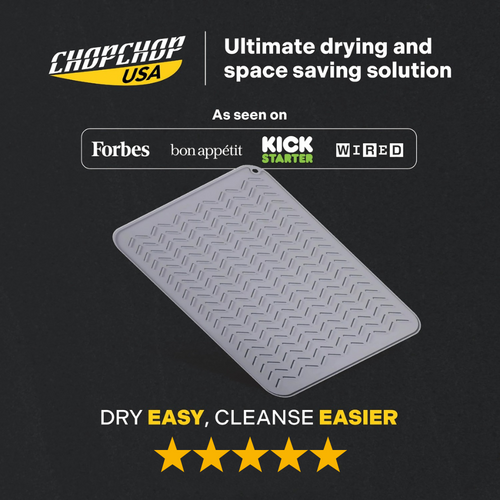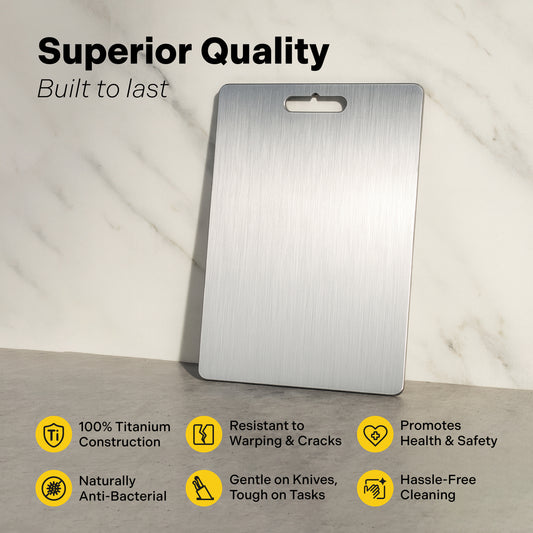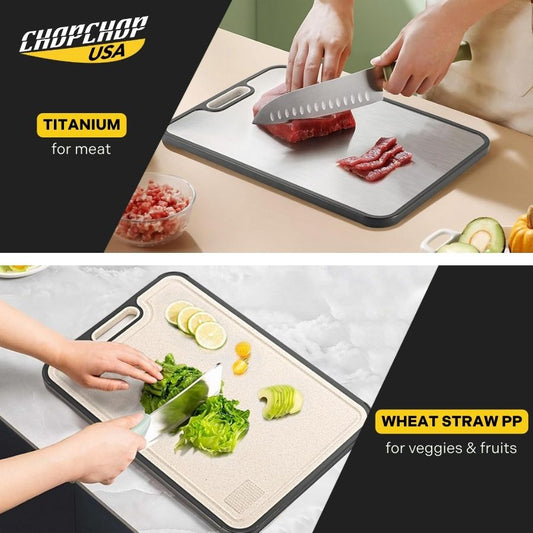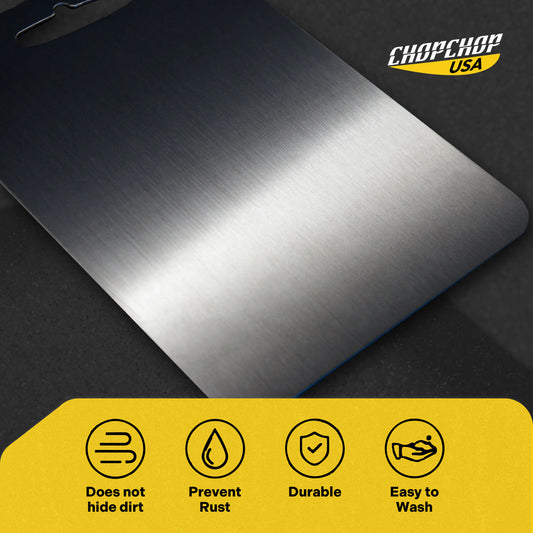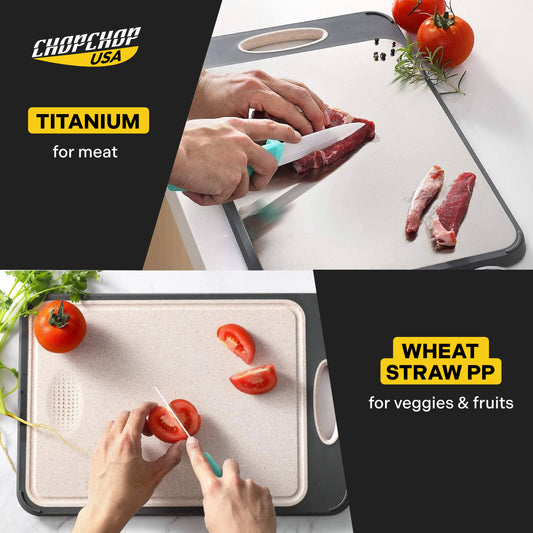Are Glass Cutting Boards Bad For Knives? In this guide, ChopChop USA will explore the truth about glass cutting boards and their impact on your kitchen tools. Whether you're a home cook or a culinary enthusiast, choosing the best cutting board is crucial to protecting your knives and improving your food prep experience. Many people are drawn to the sleek look of glass, but there are hidden downsides you should know.
Let’s break it down and help you make the best choice for your kitchen, starting with the big question: are glass cutting boards bad for knives?
What Are Glass Cutting Boards?

Glass cutting boards are typically made from tempered glass and are known for their stylish appearance and hygienic surface. They're non-porous, which makes them resistant to stains, odors, and bacteria. Often found in decorative prints or clear finishes, they appeal to those looking for a modern, sleek kitchen aesthetic.
These boards are dishwasher safe and easy to clean, which makes them attractive for low-maintenance households. However, despite their visual and hygienic benefits, their rigid and unforgiving surface raises concerns—particularly when it comes to the condition and longevity of your knives.
Many cooks begin to wonder: are glass cutting boards bad for knives over time? The answer becomes clear once we explore their impact.
Pros of Glass Cutting Boards

Are Glass Cutting Boards Safe? Glass cutting boards are popular for their sleek design and hygienic properties. While they may not be ideal for every kitchen task, they do offer several advantages—especially when it comes to cleanliness, durability, and visual appeal. Let’s look at the reasons why some people still ask, "are glass cutting boards bad for knives?" despite these benefits:
Hygienic and Non-Porous
Glass cutting boards are non-porous, which means they do not absorb moisture, bacteria, or food odors. This makes them an excellent choice for handling raw meats, poultry, and seafood—ingredients that often pose a risk of cross-contamination. The smooth surface allows for quick and easy cleaning, whether you choose to hand wash or toss it in the dishwasher.
Aesthetic Appeal
One of the biggest advantages of glass cutting boards is their visual appeal. They come in a wide variety of styles, from sleek, clear glass to colorful printed designs. For those who value kitchen aesthetics, glass boards can serve as both functional tools and decorative accents that match or enhance your overall kitchen décor.
Heat and Stain Resistance
Glass boards can withstand high temperatures, making them useful for placing hot pots and pans temporarily. They are also resistant to stains from acidic foods like tomatoes, citrus, or wine. This helps keep them looking clean and new for longer compared to plastic or wood boards that may discolor over time.
Durability Against Wear
While glass can shatter if dropped, it is highly resistant to scratching and warping under normal kitchen use. Unlike plastic boards that develop deep knife grooves or wooden boards that may crack or swell with moisture, glass remains flat and visually intact, maintaining a polished look over time.
Cons of Glass Cutting Boards

Despite their modern look and easy cleaning, glass cutting boards come with serious drawbacks—especially for your knives. Their hard, slippery surface can impact performance, safety, and the longevity of your kitchen tools. So if you're asking, are glass cutting boards bad for knives, the evidence stacks up in the "yes" column.
Damaging to Knife Edges
Tempered glass is significantly harder than steel, meaning every knife stroke causes micro-damage to the blade edge. Over time, this leads to rapid dulling, more frequent sharpening, and an overall shorter knife lifespan. High-quality knives lose their edge much faster when used on glass—raising a strong case for those questioning, are glass cutting boards bad for knives?
Lack of Cushion and Comfort
Glass offers no give when cutting. This lack of cushioning makes every chop more jarring, placing unnecessary strain on your hands and wrists during extended use. It also reduces cutting control and precision, which can be frustrating for cooks who value fine knife work like dicing or julienning.
Safety Hazards
The slick surface of a glass board can cause food or knives to slip, especially when wet. This increases the risk of accidents or injury in the kitchen. Additionally, if a glass board is dropped—even from a moderate height—it can shatter into dangerous shards, creating a serious safety concern.
Poor Choice for Daily Knife Use
Due to their impact on knives and ergonomic drawbacks, glass cutting boards are not recommended for daily prep work. While they may serve well as serving trays or for light tasks, relying on them for regular chopping or slicing is inefficient and potentially damaging to both your tools and your hands. So, again—are glass cutting boards bad for knives? Absolutely, for daily use.
How Do Glass Cutting Boards Affect Knives?
Impact on Knife Sharpness
Glass is much harder than knife steel. This leads to micro-chipping and dulling of the edge with every cut. Over time, even premium knives lose their sharpness quickly when used on glass—supporting the concern: are glass cutting boards bad for knives?
Safety Concerns
Slippery surfaces, poor grip on food, and the risk of board movement all contribute to increased chances of kitchen accidents. There’s also potential for knives to bounce or slide unpredictably. This again raises safety concerns for those wondering, are glass cutting boards bad for knives and your hands.
Alternatives to Glass Cutting Boards
- Wood: Gentle on knives, self-healing surface, aesthetically warm
- Plastic: Affordable, dishwasher-safe, forgiving surface
- Bamboo: Eco-friendly, moderately knife-safe but harder than wood
- Titanium & Stainless Steel: Ultra-durable, corrosion-resistant, and ideal for hygienic environments—perfect for certain prep tasks.
Comparing Glass with Other Cutting Boards
Not all cutting boards are created equal. Each material—glass, wood, bamboo, plastic, titanium, or stainless steel—offers unique pros and cons depending on your cooking needs and knife care priorities. Here’s a quick breakdown for readers still asking, are glass cutting boards bad for knives?
| Material | Knife-Friendliness | Durability | Hygiene | Best Use |
|---|---|---|---|---|
| Glass | ✖ Poor | ✔ Excellent | ✔ Excellent | Limited use only |
| Wood | ✔ Excellent | ✔ Good | ✔ Moderate | Everyday chopping |
| Bamboo | ✔ Moderate | ✔ Good | ✔ Moderate | Lighter tasks |
| Plastic | ✔ Good | ✔ Moderate | ✔ Good | General use, easy cleaning |
| Titanium | ✔ Great (when used with mats) | ✔✔✔ Extreme | ✔✔✔ Excellent | Premium, long-term investment |
| Stainless Steel | ✔ Excellent durability | ✔✔✔ Extreme | ✔✔✔ Excellent | Clean prep surfaces, easy sanitizing |
Glass vs. Wooden Cutting Boards

- Wood cutting boards are gentle on knives and have a natural, self-healing surface that absorbs impact and reduces wear on blades.
- They’re often made from hardwoods like maple or walnut and are favored for heavy-duty prep work.
- Compared to glass, wood is far superior for preserving knife sharpness but does require more care (e.g., regular oiling and hand washing).
Glass vs. Bamboo Cutting Boards

- Bamboo boards are eco-friendly and harder than wood, which makes them more durable but slightly more taxing on knife edges.
- They're affordable and lightweight but still safer for knives than glass.
- Bamboo is a better daily-use option if you want a balance between sustainability and moderate knife-friendliness.
Glass vs. Plastic Cutting Boards
- Plastic cutting boards are soft, inexpensive, and dishwasher-safe, making them a popular choice for casual home cooks.
- They’re gentle on knife blades but can develop deep grooves that harbor bacteria if not replaced regularly.
- Compared to glass, plastic is much more forgiving on knives and safer overall, though less attractive in design.
Glass vs. Titanium Cutting Boards

- Titanium cutting boards, especially the ChopChop USA Titanium Cutting Board and Double-Sided Titanium Cutting Board, are engineered for ultra-durability, corrosion resistance, and long-term use.
- They’re non-porous, easy to sanitize, and won’t chip, warp, or crack—even under heavy use.
- When paired with a food-grade silicone mat or used for specific prep zones, titanium offers excellent hygiene without dulling your blades.
- Compared to glass, titanium is significantly safer for knives, far more durable, and a premium choice for professionals and home chefs alike.
Glass vs. Stainless Steel Cutting Boards

- The ChopChop USA Stainless Steel Cutting Board and Double-Sided Stainless Steel Cutting Board offer a sleek, sanitary, and incredibly tough prep surface.
- Stainless steel is rust-resistant, dishwasher-safe, and ideal for raw meat, seafood, or messy ingredients.
- Like titanium, it works best when paired with a protective cutting mat to prevent blade dulling.
- Compared to glass, stainless steel is more versatile, safer for your tools, and delivers a cleaner, longer-lasting surface with none of the shatter risk. This reassures users asking, are glass cutting boards bad for knives, that better options exist.
Tips for Using Glass Cutting Boards
- Use only for cold foods, plating, or serving
- Avoid chopping with high-quality knives
- Add a non-slip mat underneath to prevent sliding
- Never use serrated or delicate blades on glass
- Clean thoroughly but avoid high-impact or aggressive knife work
These tips may reduce the damage—but if you’re still asking, are glass cutting boards bad for knives, the answer is still yes for daily prep.
Conclusion
Glass cutting boards may look stylish and offer easy cleaning, but they’re bad news for your knives. The hard surface dulls edges quickly and increases the risk of chipping and accidents. So to clearly answer the question—are glass cutting boards bad for knives? Yes, without a doubt.
For durability, hygiene, and professional-grade prep, ChopChop USA’s titanium and stainless steel boards offer a superior alternative that works with your knives—not against them.
For more amazing recipes, follow me on Facebook and Instagram! If you have any questions about ChopChop USA's products or promotions, please feel free to contact us at support@chopchopusa.com. Our dedicated team is available 24/7 and always happy to assist you.
Frequently Asked Questions
1. Can I use a glass board occasionally without ruining my knives?
Yes, for light tasks like cheese slicing or serving, occasional use is fine. Avoid chopping or dicing on it.
2. Why do my knives get dull so fast on glass boards?
Because glass is harder than the steel in your knife, each cut wears down the edge faster than wood or plastic.
3. Are titanium cutting boards safe for knives?
Yes, when paired with a food-grade mat. Titanium offers incredible hygiene and durability.


